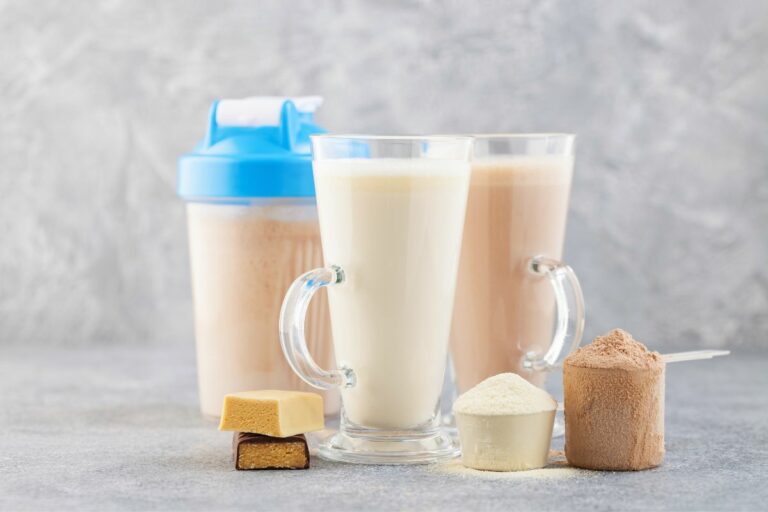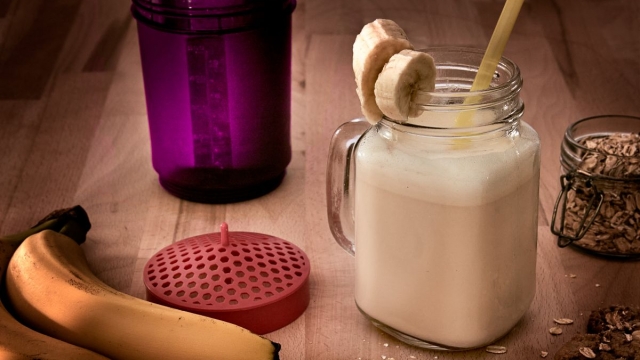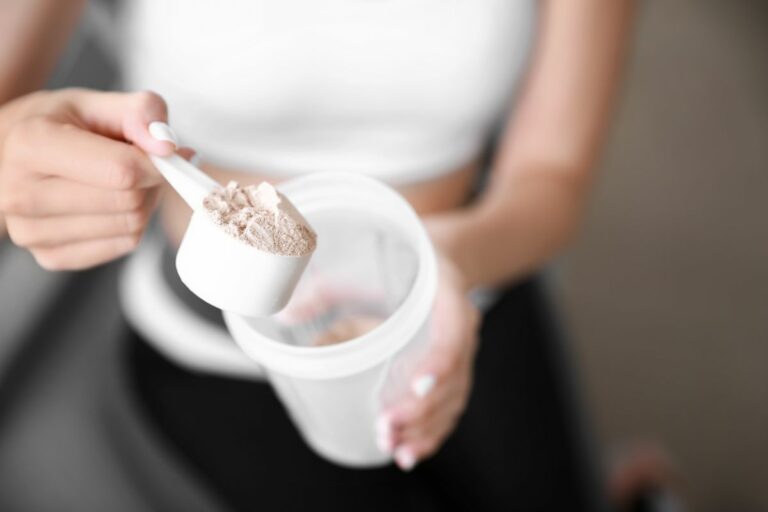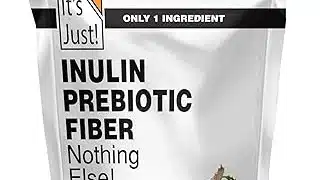How To Use Protein Powder to Lose Weight?
Protein powder, a key diet component, is essential for weight loss. It keeps you satiated, boosts metabolism, and builds lean muscle. Protein powder can be incorporated into one’s diet in a variety of ways, such as blending it into drinks or meals.
Want to lose extra fat? Protein powder can help. Read on to learn more about how to use protein powder to lose weight.
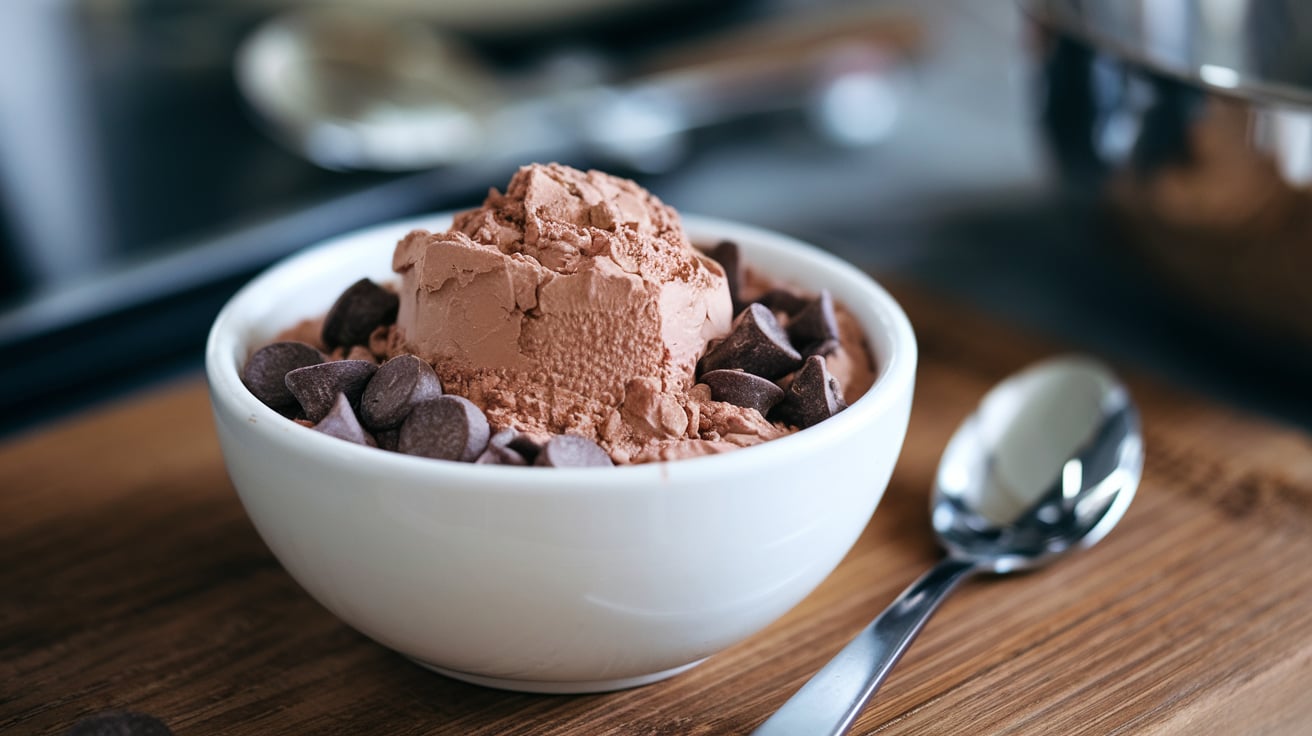
Composition of Protein Powder
Protein powders are powdered proteins derived from plants (soybeans, peas, rice, potatoes, or hemp), eggs, or milk (casein or whey).
Additional additives including thickeners, artificial flavoring, additional sugars, and vitamins and minerals could be present in the powders.
Whey protein comes in several forms, such as Whey Protein Concentrate (WPC), Whey Protein Isolate (WPI), and Whey Protein Hydrolysate (WPH), each differing in lactose content, mineral levels, and other nutritional components.
Despite these differences, they all contain essential whey proteins like beta-lactoglobulins, alpha-lactalbumins, bovine serum albumins, lactoferrins, and immunoglobulins.
- Whey Protein Concentrate (WPC): This type has up to 50% lactose and offers a protein content ranging from 30-80%, making it a cost-effective choice for boosting protein intake.
- Whey Protein Isolate (WPI): With less than 1% lactose and at least 90% protein content, WPI is ideal for those with lactose intolerance or who need a higher protein supplement.
- Whey Protein Hydrolysate (WPH): The most processed form, WPH breaks proteins down into smaller peptides, which makes it easier to digest and absorb.
Animal Based Protein Powder Or Plant Based Protein Powder?
Here’s a comparative table that outlines the key differences between plant-based and animal-based protein powders:
| Feature | Plant-Based Protein Powder | Animal-Based Protein Powder |
| Protein Completeness | May require combining sources to provide all essential amino acids, except for complete proteins like soy and quinoa. | Generally, contains all essential amino acids. |
| Digestibility . | May contain anti-nutrients that reduce digestibility; processing can improve this | Typically, more easily digested and absorbed. |
| Environmental Impact | Lower carbon footprint and uses fewer resources. | Higher carbon footprint and resource usage. |
| Nutritional Content | Often includes additional fibers and nutrients. | High in BCAAs, crucial for muscle synthesis. |
| Taste and Texture | May be grittier or have an earthier taste; newer formulas are improving this. | Typically, smoother and more neutral, mixes well with liquids. |
| Cost | Can be more expensive due to processing requirements. | Ranges in price, but options like whey are often more affordable. |
Is Protein Powder Safe?
Protein powder is generally considered safe for most individuals when they use it appropriately within a balanced diet. Nonetheless, several considerations should be taken into account:
- Choose protein powders from well-regarded brands that maintain high manufacturing standards to avoid contamination.
- Follow the manufacturer’s recommended serving size to prevent potential kidney strain and other health issues.
- Consider personal health conditions and allergies when selecting a protein powder.
- Ensure a balanced diet by integrating various protein-rich whole foods alongside protein powder.
- Increase water intake when consuming protein powder to counteract possible dehydration effects.
How Can You Use Protein Powder for Weight Loss?
Protein powder is a popular supplement among health enthusiasts and is often associated with muscle gain. However, it can also be a powerful tool in weight loss. Let’s see how you can consume protein powder:
Smoothies: Enhance your favorite smoothie recipe with a scoop of protein powder. It’s an excellent method to infuse your fruit or vegetable smoothie with extra protein.
Protein Bars: Create your own protein bars at home using protein powder, oats, nuts, and dried fruit.
Pancakes or Waffles: Incorporate some protein powder into your pancake or waffle mix for a protein-rich breakfast.
Protein Muffins: Just like pancakes, you can enrich your muffin recipe with protein powder.
Protein Pudding: Combine protein powder with Greek yogurt to whip up a protein-packed pudding.
Coffee or Tea: If you’re a fan of creamy coffee or tea, think about adding a scoop of protein powder for an additional protein boost.
Soups or Stews: Mix some protein powder into your soup or stew. It not only adds protein but also thickens the dish.
What Are the Benefits of Protein Powder?
Protein powder provides numerous advantages, particularly for those aiming to control weight, build muscle, or maintain adequate protein intake. Here are some key benefits:
Muscle regeneration and development: Protein supplements furnish the fundamental components essential for repairing and fostering muscle tissue following physical activity.
Convenient protein source: They provide a swift and effortless means to enhance protein consumption, particularly suited for individuals leading hectic lifestyles or with demanding schedules.
Adaptability: Protein powders can be seamlessly integrated into a variety of dishes and culinary preparations, including smoothies, porridge, flapjacks, or baked goods.
Comprehensive protein supply: Several protein powders, like whey and soy variants, encompass all vital amino acids, rendering them complete protein reservoirs.
Weight regulation: Protein’s ability to induce satiety and foster a sensation of fullness can aid in managing weight by curbing overall calorie intake.
Enhances athletic performance: Maintaining sufficient protein levels is imperative for athletes and those engaged in physical activities, fostering muscle recuperation, vigor, and stamina.
Supplemental nutrition: Protein powders offer a convenient avenue for individuals grappling with meeting their daily protein quotas solely through whole foods.
Options for vegans and vegetarians: Plant-derived protein powders, such as those derived from peas, hemp, or rice, cater to the dietary preferences of individuals adhering to vegan or vegetarian lifestyles.
Are There Any Side Effects of Protein Powder?
Although protein powder is generally considered safe for most individuals when consumed moderately, excessive usage or specific factors might result in potential adverse effects:
- Digestive discomfort, such as bloating, gas, or cramps, may occur in some individuals, particularly those who are intolerant to lactose or sensitive to certain ingredients.
- Overconsumption of protein can strain the kidneys over time, especially in individuals with pre-existing kidney conditions.
- Protein powder can lead to weight gain if it results in a calorie surplus without an increase in physical activity.
- Allergic reactions may occur in individuals with milk allergies, particularly with protein powders derived from dairy sources like whey protein.
- Lower-quality protein supplements may contain impurities or contaminants, emphasizing the importance of choosing reputable brands.
- Over-reliance on protein supplements can result in a nutrient imbalance, as they may lack the broad spectrum of nutrients found in whole foods.
Explore Also:
Creativehouseblog
Dietsheriff
Gigasecurehome
Balancing Protein with Other Nutrients
While protein is important, it’s also crucial to balance it with other nutrients. Carbohydrates provide the energy your body needs to function, while fats are necessary for absorption of certain vitamins and for overall cell health. A balanced diet should include a mix of protein, carbohydrates, and fats.
- Protein: The recommended intake is between 10% to 35% of your total daily calories.
- Carbohydrates: It’s suggested to consume about 45% to 65% of your total daily calories from carbohydrates.
- Fats: The recommended intake is between 20% to 35% of your total daily calories.
References
- https://www.health.harvard.edu/staying-healthy/the-hidden-dangers-of-protein-powders#:~:text=What%20is%20protein%20powder%3F,thickeners%2C%20vitamins%2C%20and%20minerals.
- https://www.eatingwell.com/article/8060421/are-protein-shakes-good-for-weight-loss/#:~:text=You%20can%20drink%20protein%20shakes,help%20reduce%20your%20calorie%20intake.
- https://thehealthychef.com/blogs/wellbeing/protein-powder-road-test-how-to-use-protein-for-weight-loss
- https://tropeaka.com.au/blogs/the-latest/how-to-use-protein-powder-for-weight-loss


